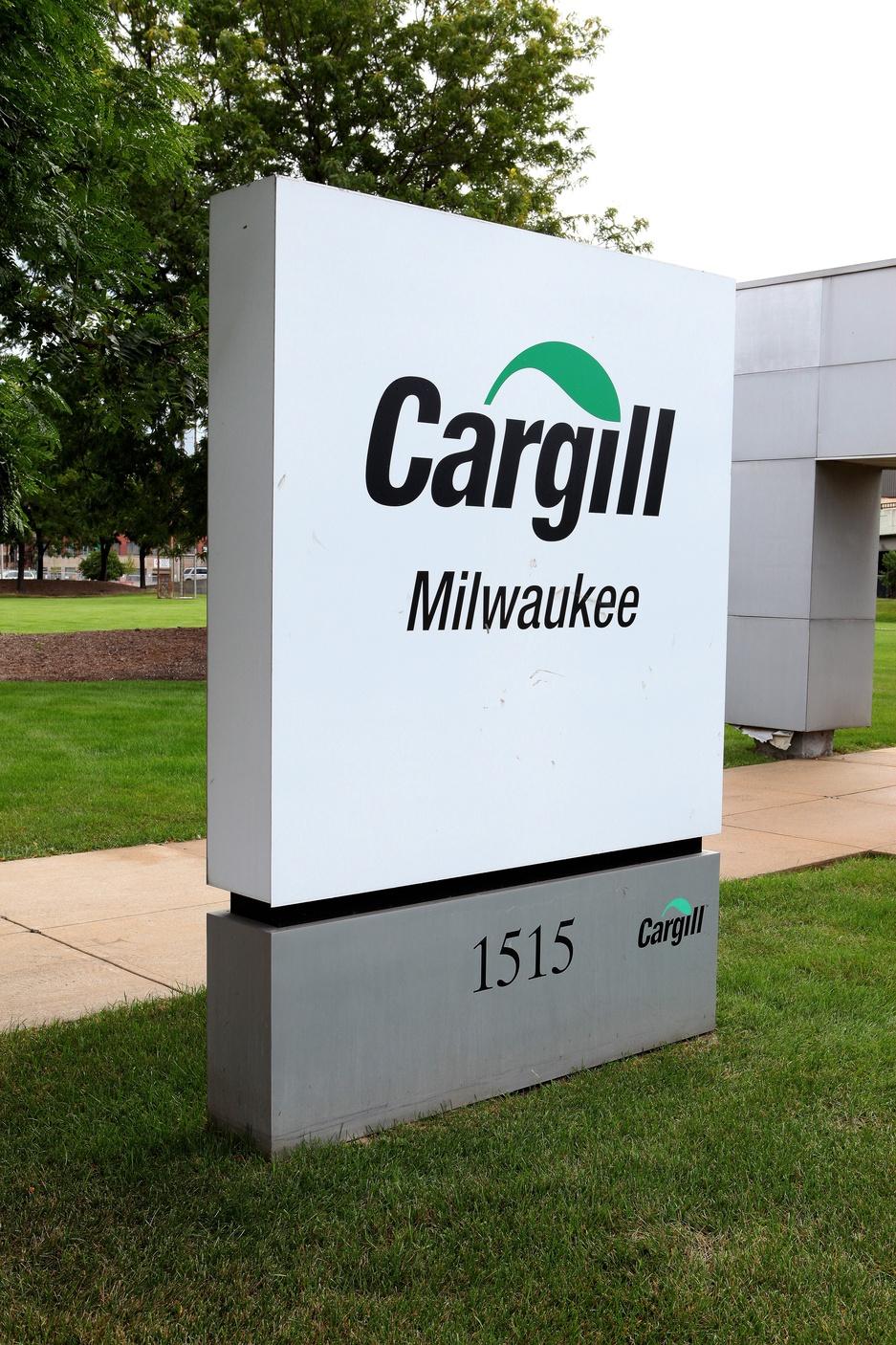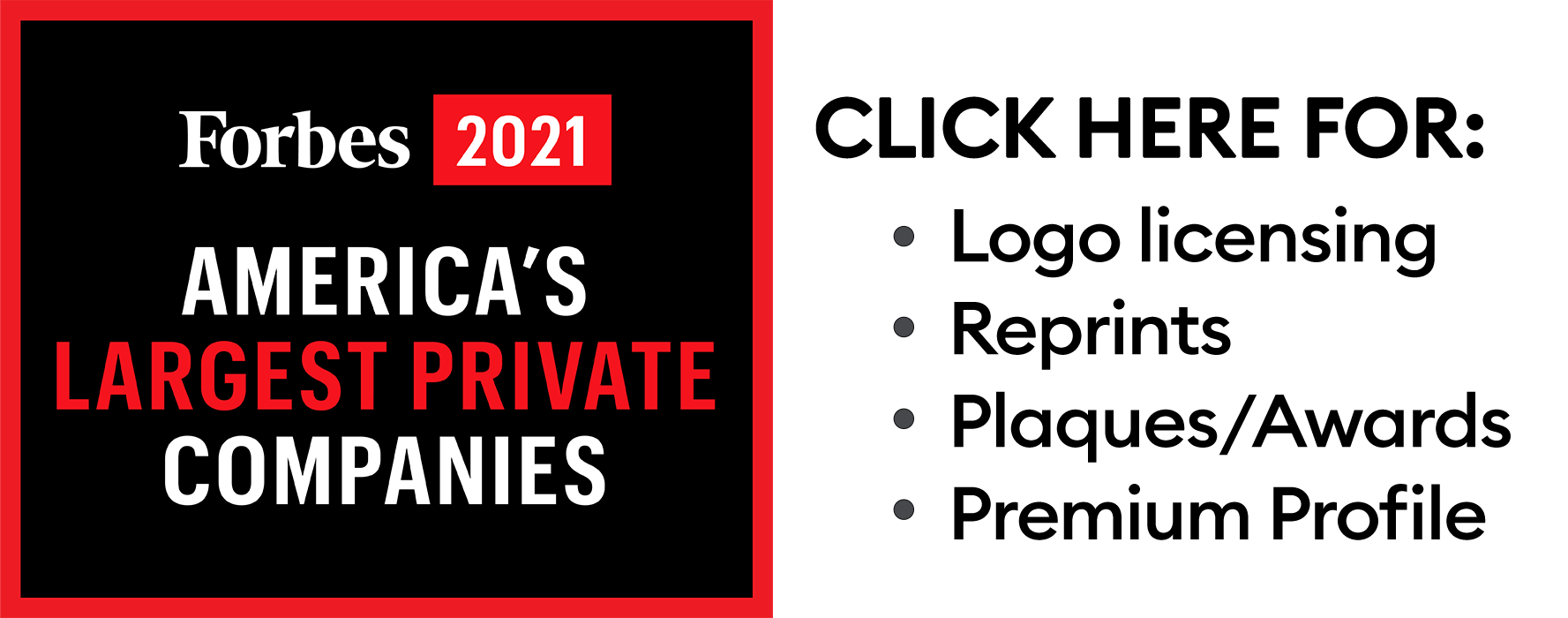
Cargill is back on top of Forbes’ annual ranking of America’s largest private companies. The agribusiness firm dropped down to No. 2 last year, only the third time Cargill missed the top spot since Forbes began tracking the country’s private companies in 1985. The Minnesota-based firm’s revenues grew 17% in the year through May 2021 to $134.4 billion, the company reported, boosted by higher prices for agricultural goods. Koch Industries slides into No. 2 this year with estimated revenues of $115 billion for the year through December 2020. The family-owned company has a variety of businesses including chemicals, refining, paper products and software. It’s been run by its billionaire chairman and CEO Charles Koch since 1967.
Other familiar names at the top of the list include candy maker Mars at No. 4, Boston-based investment giant Fidelity at No. 10 and media company Cox Communications at No. 14.
Inclusion on the list is based on revenues from the most recent fiscal year. For 80% of the companies, that means revenues for calendar 2020. Others have fiscal years that ended as recently as October 2021.
Click here to see the full list of America’s Largest Private Companies.
Medical supply outfit Medline made a splash earlier this year when it announced it was selling a majority stake to a group of private equity firms in one of the largest ever leveraged buyouts. The deal, reportedly $34 billion, closed in October. Medline remains a private company and is ranked No.16 with revenues of $17.5 billion.
Food retailers fared well with 16 of 19 supermarket firms on the list posting revenue gains since last year’s list, due in large part to increased consumer demand amid the pandemic. Revenue growth put two supermarket chains back on the list: Texas-based Brookshire Brothers at No. 162 and Arizona-based Bashas’ at No. 208. Revenues at Florida’s Publix Supermarkets (No. 3) rose 18% in 2020, helped by the company’s growing footprint. The supermarket giant opened 39 new stores last year. In September Publix announced that it will expand to Kentucky in late 2023.
Southeastern Grocers, No. 38, has been flirting with a public offering for years but cancelled plans for an IPO earlier this month. Plans for an IPO in 2014 were also cancelled. Southeastern owns the Winn-Dixie, Harveys Supermarkets and Fresco Y Más banners and has estimated revenues of $9.6 billion.
There’s always some movement both on and off the list. This year 19 companies didn’t qualify for inclusion because of falling revenues, an acquisition, or a public offering. Ten firms fell off because declining revenues put them below the below $2 billion list threshold. Furniture maker Haworth was affected by the downturn in the office furniture market and revenues fell by 19% to $1.8 billion in 2020. Revenues at hospitality company Delaware North fell by 61% to $1.45 billion due to cancellations of sporting events and a slowdown in business at airports—two areas where it operates.
The most high-profile exit was Airbnb. The home rental company went public via an IPO worth $47 billion in December 2020 after spending just two years on the list. Joining Airbnb as public companies are Petco Animal Supplies, Vizio and Jo-Ann Stores. Vizio filed to go public back in 2015 but withdrew the following year when it agreed to be sold to a Chinese company. That deal ultimately fell through and Vizio remained private until March of this year. Founder William Wang remains CEO.
Two companies no longer appear due to acquisitions. Warehouse grocery chain Smart & Final was acquired in May 2021 by Bodega Latina, a subsidiary of Mexico’s Grupo Comercial Chedraui. The Nature’s Bounty, a New York-based vitamin maker, was sold to Nestlé in August 2021 for $5.75 billion.
Accounting firms Deloitte, PricewaterhouseCoopers and Ernst & Young were taken off the list because all three have global headquarters overseas.
A total of twenty-five companies entered the ranks this year as either a newcomer or a returnee (defined as a company that appeared previously, fell off, and is now back on the list). The highest ranked newcomer is Uline at No. 73. The Wisconsin-based company sells shipping and other business supplies and has estimated revenues of $5.8 billion.
Newly formed Ultimate Kronos Group joins the list at No. 138 with sales of $3.3 billion. The cloud computing company specializes in workforce and human resource management. It was formed in April 2020 through the merger of Ultimate Software and Kronos Inc.
Michaels Companies, the arts, crafts, and framing retailer, is back on our list, its third go around as a private company. Michaels got its start in 1973 and was listed on the Nasdaq in 1984. Blackstone and Bain Capital acquired Michaels in late 2006;it went public again in 2014. Apollo Global Management took Michaels private again in April of this year in a $3.3 billion deal. Interestingly, Michaels debuted at No. 81 in 2007, the same rank as this year.
Grocery store chain Brookshire Brothers, ranked No. 162, returns to the list after 12 years. It fell out of the rankings when list minimum was raised to revenues of $2 billion in 2009. Brookshire Brothers is related to another company on the list, Brookshire Grocery, No. 168. A split between the founding brothers in 1938 resulted in two separate companies.

Methodology
Forbes’ list of largest private companies in America includes U.S. based firms with revenue greater than $2 billion in the most recent fiscal year. Most of the companies have no plans to change their private status. Many businesses like the freedom from quarterly earnings expectations and reduced obligations to Sarbanes-Oxley reporting requirements.(Private companies with publicly traded debt must file financial statements with the Securities and Exchange Commission.) We exclude companies based outside the U.S., companies that don’t pay income tax (like Mohegan Tribal Gaming Authority), mutually owned companies (like State Farm Insurance), cooperatives (like Land O’Lakes), companies with fewer than 100 employees, and companies that are more than 50% owned by another public, private or non-U.S. company. We also leave out companies whose primary business is auto dealerships or real estate investment and/or management. We do include companies that are majority owned by private companies, such as Medline Industries. Whenever possible, our revenue figures for each company exclude sales of publicly traded subsidiaries. Our data sources include voluntary disclosures by companies, Securities and Exchange Commission filings and estimates from Forbes researchers and outside sources.







